
A. J. Raffles is a British fictional character – a cricketer and gentleman thief – created by E. W. Hornung. Between 1898 and 1909, Hornung wrote a series of 26 short stories, two plays, and a novel about Raffles and his fictional chronicler, Harry "Bunny" Manders.
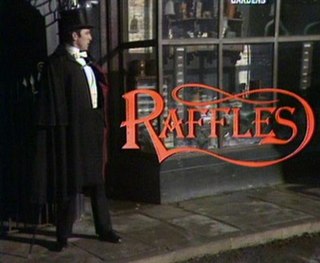
Raffles is a 1977 television series adapted from the A. J. Raffles stories by E. W. Hornung. The stories were adapted by Philip Mackie.
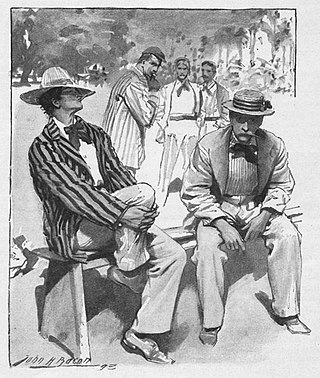
Harry Manders is a fictional character in the popular series of Raffles stories by E. W. Hornung. He is the companion of A. J. Raffles, a cricketer and gentleman thief, who makes a living robbing the rich in late Victorian British High Society.

"The Gift of the Emperor" is a short story by E. W. Hornung, and features the gentleman thief A. J. Raffles, and his companion and biographer, Bunny Manders. The story was first published in October 1898 by Cassell's Magazine. The story was also included as the eight and last story in the collection The Amateur Cracksman, published by Methuen & Co. Ltd in London, and Charles Scribner's Sons in New York, both in 1899.

The Amateur Cracksman is an 1899 short story collection by E. W. Hornung. It was published in the UK by Methuen & Co., London, and in the US by Scribner's, New York. Many later editions expand the title to Raffles: The Amateur Cracksman. Some editions such as Penguin Books, 1948, retitle the collection simply, Raffles.

"A Trap to Catch a Cracksman" is a short story by E. W. Hornung, and features the gentleman thief A. J. Raffles, and his companion and biographer, Bunny Manders. The story was published in July 1905 by Pall Mall Magazine in London. The story was also included as the seventh story in the collection A Thief in the Night, published by Chatto & Windus in London, and Charles Scribner's Sons in New York, both in 1905.

Arthur J. Raffles is a fictional character created in 1898 by E. W. Hornung, brother-in-law of Sir Arthur Conan Doyle, the creator of Sherlock Holmes. Raffles is, in many ways, an inversion of Holmes – he is a "gentleman thief", living at the Albany, a prestigious address in London, playing cricket as a gentleman for the Gentlemen of England and supporting himself by carrying out ingenious burglaries. He is called the "Amateur Cracksman" and often, at first, differentiates between him and the "professors" – professional criminals from the lower classes.

"A Costume Piece" is a short story by E. W. Hornung, and features the gentleman thief A. J. Raffles, and his companion and biographer, Bunny Manders. The story was first published in July 1898 by Cassell's Magazine. The story was also included in the collection The Amateur Cracksman, published by Methuen & Co. Ltd in London, and Charles Scribner's Sons in New York, both in 1899.
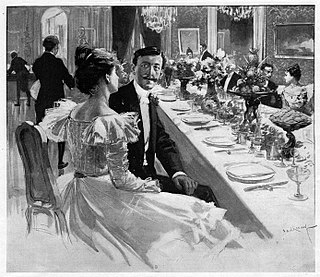
"Gentlemen and Players" is a short story by E. W. Hornung, and features the gentleman thief A. J. Raffles, and his companion and biographer, Bunny Manders. The story was first published in August 1898 by Cassell's Magazine. The story was also included in the collection The Amateur Cracksman, published by Methuen & Co. Ltd in London, and Charles Scribner's Sons in New York, both in 1899.

"Le Premier Pas" is a short story by E. W. Hornung, and features the gentleman thief A. J. Raffles, and his companion and biographer, Bunny Manders. The story was first published as the fourth story in the collection The Amateur Cracksman, published by Methuen & Co. Ltd in London, and Charles Scribner's Sons in New York, both in 1899. This and "Wilful Murder" were the two stories in the collection not published previously in magazine format.
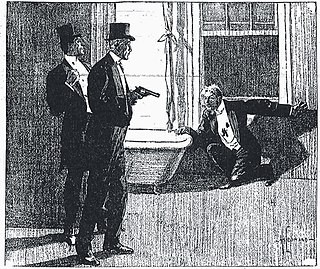
"Wilful Murder" is a short story by E. W. Hornung, and features the gentleman thief A. J. Raffles, and his companion and biographer, Bunny Manders. The story was first published as the fifth part of the collection The Amateur Cracksman, published by Methuen & Co. Ltd in London, and Charles Scribner's Sons in New York, both in 1899. This and "Le Premier Pas" were the two stories in the collection not published previously in magazine format.

"Nine Points of the Law" is a short story by E. W. Hornung, and features the gentleman thief A. J. Raffles, and his companion and biographer, Bunny Manders. The story was first published in September 1898 by Cassell's Magazine. The story was also included as the six story in the collection The Amateur Cracksman, published by Methuen & Co. Ltd in London, and Charles Scribner's Sons in New York, both in 1899.

"The Return Match" is a short story by E. W. Hornung, and features the gentleman thief A. J. Raffles, and his companion and biographer, Bunny Manders. The story was first published in October 1898 by Cassell's Magazine. The story was also included as the seventh story in the collection The Amateur Cracksman, published by Methuen & Co. Ltd in London, and Charles Scribner's Sons in New York, both in 1899.

"No Sinecure" is a short story by E. W. Hornung, and features the gentleman thief A. J. Raffles, and his companion and biographer, Bunny Manders. The story was first published in Scribner's Magazine in January 1901. The story was also included as the first story in the collection The Black Mask, published by Grant Richards in London, and Charles Scribner's Sons in New York, both in 1901.

"To Catch a Thief" is a short story by E. W. Hornung, and features the gentleman thief A. J. Raffles, and his companion and biographer, Bunny Manders. The story was first published in Scribner's Magazine in May 1901. The story was also included as the fifth story in the collection The Black Mask, published by Grant Richards in London, and Charles Scribner's Sons in New York, both in 1901.

"An Old Flame" is a short story by E. W. Hornung, and features the gentleman thief A. J. Raffles, and his companion and biographer, Bunny Manders. The story was first published in Scribner's Magazine in June 1901. The story was also included as the sixth story in the collection The Black Mask, published by Grant Richards in London, and Charles Scribner's Sons in New York, both in 1901.
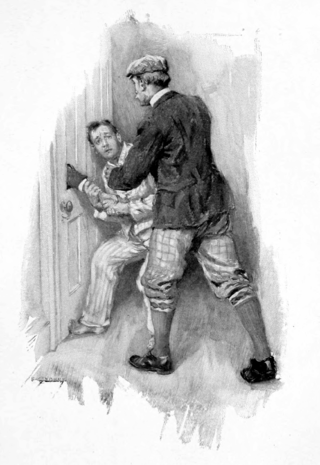
"The Wrong House" is a short story by E. W. Hornung, and features the gentleman thief A. J. Raffles, and his companion and biographer, Bunny Manders. The story was first published in Scribner's Magazine in September 1901. The story was also included as the seventh story in the collection The Black Mask, published by Grant Richards in London, and Charles Scribner's Sons in New York, both in 1901.

"Out of Paradise" is a short story by E. W. Hornung, and features the gentleman thief A. J. Raffles, and his companion and biographer, Bunny Manders. The story was first published in December 1904 by Collier's Weekly in New York, and in January 1905 by Pall Mall Magazine in London. The story was also included as the first story in the collection A Thief in the Night, published by Chatto & Windus in London, and Charles Scribner's Sons in New York, both in 1905.
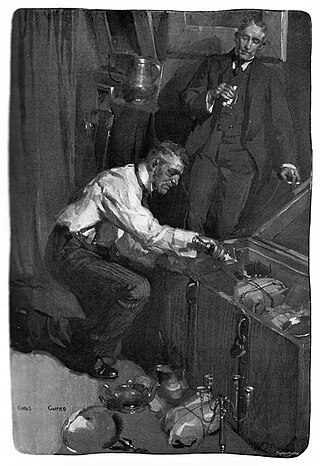
"The Chest of Silver" is a short story by E. W. Hornung, and features the gentleman thief A. J. Raffles, and his companion and biographer, Bunny Manders. The story was published in January 1905 by Collier's Weekly in New York, and in February 1905 by Pall Mall Magazine in London. It was also included as the second story in the collection A Thief in the Night, published by Chatto & Windus in London, and Charles Scribner's Sons in New York, both in 1905.
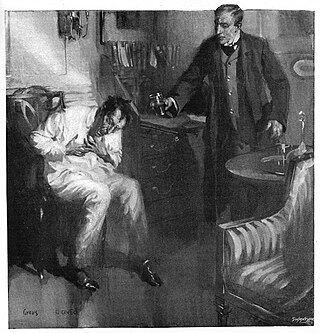
"A Bad Night" is a short story by E. W. Hornung, and features the gentleman thief A. J. Raffles, and his companion and biographer, Bunny Manders. The story was published in June 1905 by Pall Mall Magazine in London. The story was also included as the sixth story in the collection A Thief in the Night, published by Chatto & Windus in London, and Charles Scribner's Sons in New York, both in 1905.





















